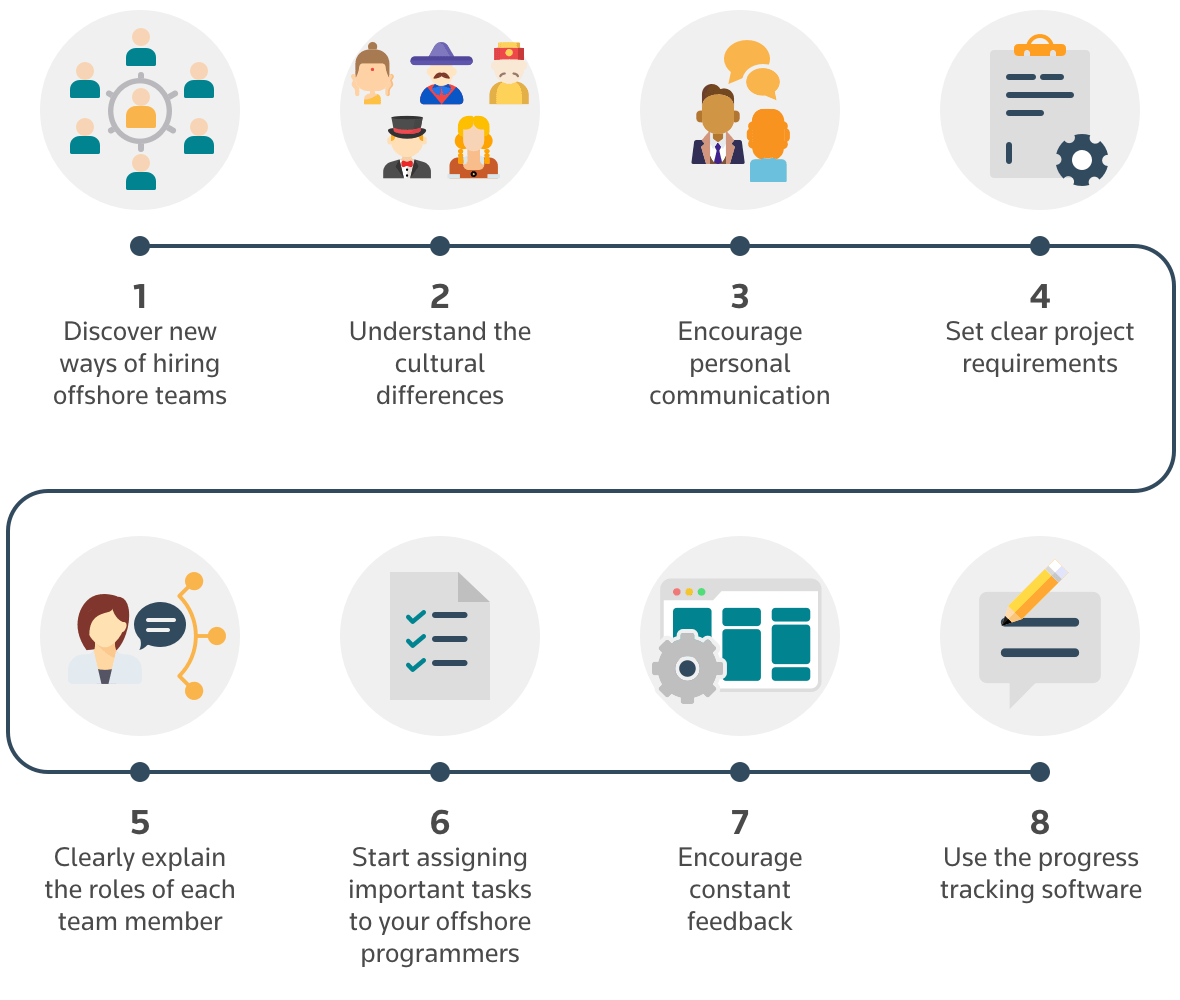For new start-up businesses, software development will often present some major barriers to overcome. Successful product development usually requires a cohesive and highly skilled team to be working together over a period of time.
Unfortunately, staff, time, money, and a strong team dynamic are usually limited in the early days of any business. The solution for these entrepreneurs may be to hire a team of remote developers to assist with your software requirements, especially in the early stages. However, your company may face disappointing results if you make mistakes in the hiring process. In the article, we’ll explore the best hiring practices to find a reliable outsourcing partner and helpful tips on building trust with your offshore development team.
How to Choose a Software Development Team That Will Support Your Startup
To minimize the chance of failure with offshoring, here are our top five points a start-up founder should be considering. Assuming all the potential options for the offshore development company are fully qualified and accredited on paper, this list should help you come to a rational decision about who will handle your project best.
1) Establish your objectives – At the beginning of a business’s life cycle, the most important thing to share is a strong vision. Everyone must be working towards the same goals. When developing software, you should be trying to solve a known problem in an innovative way, so make sure you are ready to convey this to your team.
2) Consider your expectations – When considering your options for hiring a team, check that your expectations match the proposals you are seeing. If they seem disjointed, you may need to re-evaluate your own ideas about what to expect or look elsewhere.
3) Recognise value for money – A very cheap option will rarely produce the best results when the project is complete, because the necessary skills and experience you are looking for may not be available at a low price point. You need to remember that paying more in the short term for a fantastic, fully qualified dedicated development team could make the best business sense.
4) Think about scalability – If your business shows signs of success early on, you may well want to increase the size of your team and set your sights higher. You need to be sure that this will not only be a cost-effective step but also will not negatively impact the effectiveness of your initial team. For instance, your entire team cannot be dependent on one person or resource with a finite capacity, because this would make scaling up impossible.
5) Focus on problem-solving – One of the most crucial things your team will be working on, regardless of your goal, is problem-solving. Developers can only succeed if they are agile and adaptable, otherwise, your entire timescale could be thrown off by minor setbacks. Your team needs to be highly adept at communicating and finding creative solutions in a fast-paced environment, otherwise, your business will probably be changing too fast for them to keep up.
8 Best Practices for Making Your Offshore Development Team a Success
Trust is a key component of meaningful collaboration for every remote team. Without a considerable effort to foster transparency and encourage bonding between distributed team members, remote teams can be prone to misunderstandings and assumptions that break down trust.
Though remote teammates rarely get a chance to see each other in person, you can use some proactive strategies for more efficient remote team management. They will help you to cultivate a productive working environment and foster strong relationships between teammates.
Are you ready to leave all potential risks behind and build trust with your offshore development team?
Here are some of the best practices to make it happen:

- Discover new ways of hiring offshore teams and collaborating with them. Sometimes a new and fresh solution can work miracles and completely revolutionize your collaboration with the remote teams.
Try using niche tech talent marketplaces such as YouTeam which was built specifically for working with and hiring the remote teams. This is a relatively new but reliable way to set up and run your project in an innovative and trustworthy environment.
- Understand cultural differences. Judith A. Ross, the author of the “Trust Makes the Team Go Round” article in Harvard Business Review, emphasizes that Americans tend to get straight to the business in emails.
Unfortunately, people from other cultures may consider this as rudeness. It is important to educate both the head office and remote team members on those cross-cultural differences to avoid any misunderstanding and frustration, which can also hamper trust.
- Encourage face-to-face communication. Even if you are far away from your team or even live in different time zones, you can meet with them in person by traveling to their location and having them travel to your development center. Synchronization with the team allows you to break the ice, get to know each other better, and get used to each other’s communication style.
This improves business communication, ensures a smooth workflow, and develops trust. Besides, after visiting your head office, your offshore development team members will have a better understanding of your business and how you organize everything in your office. This will also make them feel that they are a part of your team and create more trust.
- Set clear project requirements. Vague and ambiguous expectations from your offshore development team can ruin trust in seconds. That’s why we recommend that you remain transparent when sharing your expectations, goals, and requirements. You should also check whether your team follows the plan and is on the correct path to achieve the set pre-determined goals.
This can be reached with the help of regular video conferences where each team member is staying in a separate room, so everyone can see each other’s faces. If some of your team members fail to achieve certain goals, the management should find a way to help them fix their problems.
That would also be a good idea to add using agile methodology. This will help the service provider to efficiently run all the projects such as app development and web development by breaking them up into small phases which will help the whole team to constantly communicate and discuss every step even if there are time zone differences.
- Clearly explain the roles of each team member. To build mutual trust, it is essential that each team member clearly knows not only their own roles and responsibilities but also those of their teammates. For example, UX designers and developers often work closely together in the process of building digital products. You can highlight these roles during the meetings so that the members know who is responsible for that specific part of the project.
- Use communication tools for not only having your team of developers connected with each other but also for running the development process. Among some of the most popular applications, especially made for this purpose can be Slack, Github and Zoom.
- Start assigning important tasks to your offshore programmers. Sometimes the project managers at head office do have not enough trust in their offshore team members and thus give them mediocre tasks while the in-house team members work on the functionality of greater importance. It can not only bring mistrust but also cause the demotivation of offshore developers.
As a result, they will leave the company in search of more interesting and rewarding tasks. After all, offshore developers work not just for money but also for professional growth.
That’s why it is critical that you gradually build trust by assigning them meaningful work, at least in small chunks at the beginning. The golden rule is to trust your remote team members unless proven otherwise.
- Encourage constant feedback. In some cultures, people shy away from voicing any issues that they are experiencing because of fear that it may be a sign of their low competence. However, it actually can help a lot and prevent the issue from being escalated to higher levels.
Therefore, it is crucial that you explain to your remote team members that it is okay to make mistakes and let the management know about them as soon as possible.
By the way, such issues may happen even to the tech giants. For example, this spring Google has discovered a security bug in its Google+ network but did not initially share the information about this bug in order to avoid reputational damage.
- Use the progress tracking software. The market is now full of tools that make remote team management easier and more trustworthy. Instead of exchanging tons of emails that may lead to miscommunication and mistrust, you can use software such as Jira, Asana, Trello, or even ask your developers to create an internal tracking product.
As a result, you will clearly see the tasks and progress of your remote team members, thus getting a clearer picture of their work results.
Using these strategies, you can eliminate trust issues and nourish an enthusiastic working environment.
Remote work is a trend, which is different from tendencies that just come and go. Unlike all other workplace trends, distributed teams are here to stay.
‘Don’t be so sure’ — you’d say. Well, we understand your doubts, so let us dispel them with some relevant facts and statistics.
- Self-paced and micro-learning programs for remote teams are expected to grow in number in 2019.
- Represents of Generation Z amount to 36% of the global workforce today; they push forward the popularity of remote work.
- Currently, there are 5 positions available for 1 engineer. Placing a job with a remote work option is proven to help companies reach out to a greater talent pool.
- Companies that embrace distributed working environment can increase employee retention rates by 10%.
- 50% of developers would prefer remote work to a full-time position.
The future of remote work is calling.
If you are ready to answer, we at YouTeam will be happy to find the best candidates for you.
Ready to start? Just drop us a line — our support team will handle all the rest.







